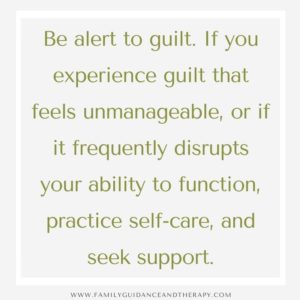Guilt is a normal, healthy, yet powerful emotion. Feelings of guilt, however, can become consuming and not-so-healthy when left unchecked.
Prior to the pandemic, you may have flourished in life without any feelings of guilt, but coronavirus has turned our lives in many different directions—some good and some bad. Those that are doing well in the crisis often find themselves surprised by, and uncomfortable with, survivor’s guilt.
The Root of Survivor’s Guilt
You are maintaining or flourishing in life despite coronavirus. You do feel some fear, which is natural because the virus has negatively affected so many lives. Your grateful feelings supersede your fear. So, where does your nagging feeling of guilt come from?
The root of healthy survivor’s guilt contains one main ingredient—empathy.
Your guilty thoughts may sound like this:
- I feel guilty for doing well financially during the pandemic. I cannot tell anyone. So many others have lost their businesses and jobs.
- I feel guilty that I have lost weight in quarantine. I refuse to share this with anyone. My friends tell me they have put on weight during stay-at-home measures.
- I feel guilty because I enjoy working virtually from home. I flourish in my work-at-home environment away from office politics and irritating people. My co-workers tell me that they struggle and long for the return of our in-person office.
- I feel guilty because I generally feel happier than I did before coronavirus. I keep this under my hat. Friends and loved ones confide in me that they feel depressed and are having difficulty coping.
- I feel guilty because I am well, and my family has not suffered with the virus. Many people are ill and have lost loved ones.
Each of these thoughts stems from cognitive empathy, the ability to identify and understand other people’s emotions.
Empathy is crucial for good mental health. It supports our ability to connect with people and maintain healthy relationships.
Tackling Your Guilt
Firsthand, remember that it is okay to be happy during the pandemic.
It is okay to enjoy your accomplishments and well-being despite the misfortunes of others.
It is also okay to occasionally feel guilty as your survivor’s guilt stems from your caring emphatic heart, and not from something that you have done wrong. The pandemic is not your fault.
Allow yourself to enjoy your well-being. Celebrate your accomplishments. You have done well during the pandemic because you have managed your life. Yes, some of it may be due to good fortune, but, whatever the reason, give yourself credit where credit is due.
Mindful Practices – Awareness of Guilt
Practice self-compassion by acknowledging your guilt and giving it a name. Or call it what the world has tagged it—survivor’s guilt (i.e., pandemic guilt, coronavirus guilt, thriver guilt). This will help you to take the pressure off yourself.
Avoid chastising yourself for guilty feelings. Be aware of self-talk, such as, “I should get up early like I used to. I should be thinking of others and not myself! It looks lazy!” Reverse that thought and replace it with, “I am feeling so much healthier. My new schedule aligns with my physical and mental well-being. I am working, and it is productive! I will share this with others so they might flourish too!”
Related: Surviving Pandemic Fatigue
Develop a mindset that builds self-awareness of your guilt feelings. When you feel guilty, ask yourself “What is the truth”? Are you feeling guilty about something that you cannot change?
You cannot change the pandemic, nor the circumstances that stem from it. Are you feeling guilty for taking care of yourself? Bravo to you for taking care of you! Be aware that self-care always relies on self-awareness, which fends off mental illness.
If you find that reframing your guilt is difficult mentally, consider journaling. Write your guilty thoughts out exactly as you feel them. Then, follow up with a statement of truth.
It might look like this, “I am feeling guilty! I bought new furniture today. I have needed it for so long! I cannot tell anyone that I have done this…especially not during these difficult times. I must keep this under wraps!” The truth statement may look like this, “It is okay to take care of me. It is okay that I am doing well during the pandemic.
It is okay to tell those that I love that I have been able to take care of myself. Sharing this truth with others may be the encouragement that they need!”
Maintain Your Support System
We all need a healthy support system comprised of people that we like, respect, and trust—supportive people that want to know that we are doing well.
The key to good communication is to listen. Listening is something that you can freely give to others, and they can gift back to you, despite any extenuating circumstances. Listening is an integral piece in the construction of relationships and is especially important in today’s environment.
Respond with empathy, not out of guilt, and acknowledge the feelings and difficulties that others experience. Apologize only when it is called for—when you have done something hurtful, or when you have made a mistake.
Social media, unless you only share with your closest of loved ones, is not a reliable support platform. People in this setting may be quick to shame or criticize you when you share good news, and this may lead you to experience unnecessary guilt.
Protect yourself and choose ‘your people’ wisely. There is no guilt in that!
Show Yourself Compassion
In these uncharted times, remember to show yourself compassion. Feelings of guilt can be a normal side-effect. Have patience with yourself. Children can show self-compassion too!
Be alert to guilt.
If you experience guilt that feels unmanageable, or if it frequently disrupts your ability to function, practice self-care, and seek support.
At the Family Guidance & Therapy Center, we recognize that help should come in a format that matches your life. If you would like to find out if internet-based therapy would work for you. Please reach out and see how we can help. You are not alone. Call, text, or make an appointment now.

